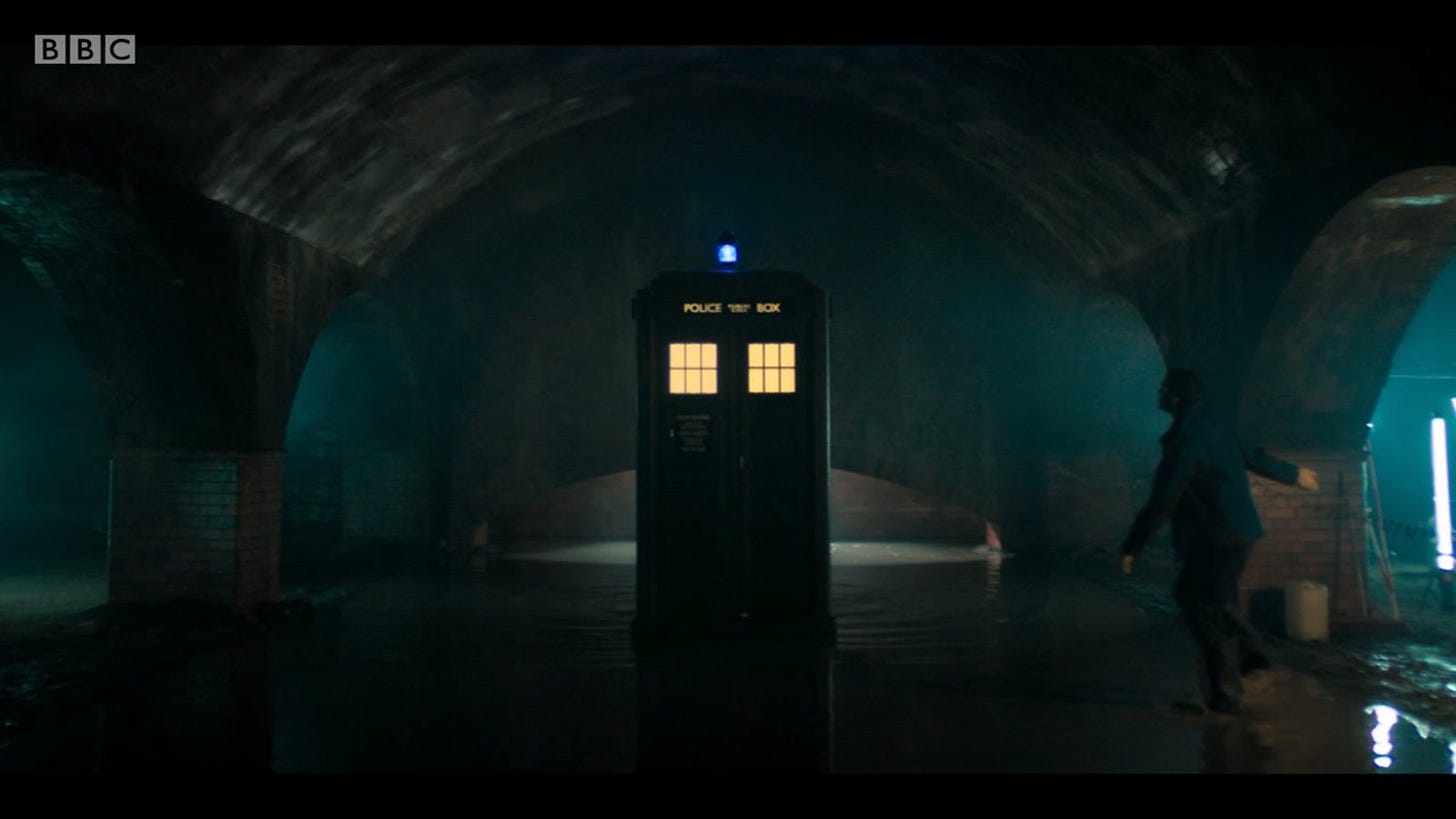Best of Enemies
"Resolution" inaugurates a new Doctor Who tradition by resurrecting the franchise's best-known nemesis.
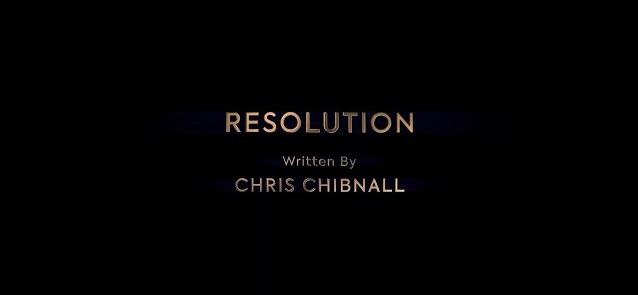
Doctor Who
“Resolution”
New Year’s Day 2019 Special
Written by Chris Chibnall
Directed by Wayne Yip
Starring Jodie Whittaker, Tosin Cole, Mandip Gill, and Bradley Walsh
Guest Starring Daniel Adegboyega, Nicholas Briggs, Nikesh Patel, and Charlotte Ritchie
60 minutes
Original Broadcast 1 January 2019
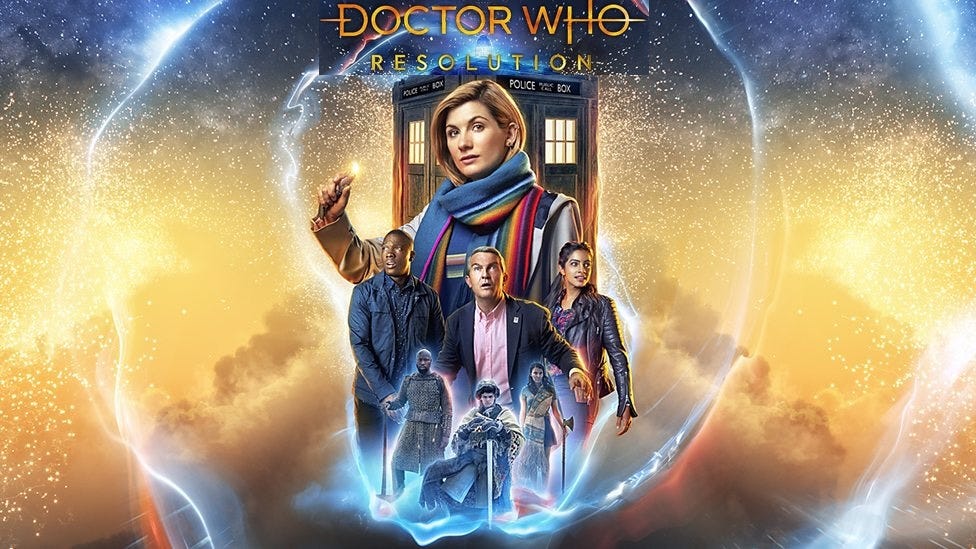
1. New Traditions
When the British Broadcasting Corporation (BBC) announced in November 2018 that Doctor Who would forgo its traditional Christmas Day Special episode in favor of a New Year’s Day Special to be broadcast on 1 January 2019, some fans rebelled. They issued hysterical proclamations that this choice signaled doom for the program, that new showrunner Chris Chibnall was flushing the 55-year-old franchise’s traditions down the drain, and that this move indicated that Series 11 might be the death knell for New Who, which returned to our television screens in 2005 and has remained a fixture there ever since, but, in these haters’ fevered speculations, was now clearly marked for the scrap heap of television history.
Some outlets claimed that this programming decision meant the production team had run out of ideas for Doctor Who Christmas Specials and began pitching their own plots, perhaps none more notorious than the Daily Mirror, which quoted ex-showrunner Steven Moffat as saying, “I sort of think we might have mined, or possibly over mined, every single thing we could about Christmas in Doctor Who and the last time we more or less ignored it.”1
Moffat here refers to his final-at-the-time Who script, 2017’s “Twice Upon a Time,”2 which rarely acknowledges the holiday during its 61-minute length despite being set around Christmas Day 1914 and World War I’s so-called Christmas Armistice (or, in some renderings, the Christmas Truce). Please note that Chris Chibnall never publicly expressed similar sentiments even if Moffat’s perspective makes sense when we consider that, beginning with the Tenth Doctor’s (David Tennant’s) first full adventure, “The Christmas Invasion”—originally broadcast on 25 December 2005—Doctor Who has premiered a festively themed outing every Yuletide season since.
This episode normally nets boffo ratings for BBC One and BBC America, while the Christmas Day Special has also become the traditional place for the Doctor’s current incarnation to regenerate into his successor, with the Tenth, Eleventh (Matt Smith), and Twelfth (Peter Capaldi) Doctors all beginning the process of handing over the TARDIS’s keys to their replacements on Christmas Day.
Then, on 10 December 2018, the BBC announced that Series 12 would premiere in early 2020, meaning no more Doctor Who in 2019. That was a pity, but Chibnall’s decision to bump the annual special to New Year’s Day at least allowed the BBC to claim that New Who had appeared on air for 15 consecutive years since this single hour, appropriately titled “Resolution,” occurred during 2019 (even if it served as a coda to 2018’s excellent Series 11).
And, as many other fans pointed out, New Who had once before broadcast a New Year’s Day Special. In 2010, the Tenth Doctor’s regeneration story, worryingly titled “The End of Time,” served as a two-part farewell to Tennant’s protagonist by splitting its segments between Christmas Day 2009 and New Year’s Day 2010 to help salve the wound that the Tenth Doctor’s departure inflicted upon Who fans everywhere (and that, as Russell T. Davies’s final-at-the-time contribution to onscreen Who, remains a fantastic, absurd, and emotionally resonant piece of entertainment).

2. Old Enemies
So Chibnall has his work cut out for him captaining Doctor Who into a new tradition: a New Year’s Day episode that says goodbye to the previous season (and year) while preparing viewers for the season yet to come. Chibnall, I’m happy to say, meets this challenge with aplomb in an hour that not only resurrects the Doctor’s most dangerous foe but also makes that nemesis frightening again.
Yes, friends, the Daleks are back, even if Chibnall, in several press interviews before Series 11’s launch, claimed that none of Doctor Who’s traditional monsters or enemies would appear in his inaugural season as showrunner.3 Chibnall, indeed, more than once stated his intention to create new opponents for the Thirteenth Doctor to face during Series 11 as a way to differentiate his vision of Doctor Who from both the Davies and Moffat eras while keeping Doctor Who competitive in our ongoing Age of “Peak TV.”4 And, technically, Chibnall’s kept his word: “Resolution,” although filmed alongside Series 11’s ten episodes, doesn’t officially belong to Series 11, even receiving its own, independent Blu-ray release.
Yet that’s little more than corporate hair-splitting. “Resolution” is perfectly titled since this entry offers plenty of, well, resolutions to the events, character arcs, and significant themes that Chibnall and his writing staff braid throughout Series 11. Although this episode fails to return Sharon D. Clarke’s marvelous Grace Sinclair-O’Brien to life, as I’d hoped, it does see the Thirteenth Doctor’s companion Ryan Sinclair (Tosin Cole) meet his errant father, Aaron (Daniel Adegboyega), a man whom Series 11’s premiere (“The Woman Who Fell to Earth”) established as refusing to attend Grace’s funeral and who left Ryan’s household after Aaron’s wife (and Ryan’s mother) died of a heart attack in 2012. Although Grace and Graham picked up the parental slack by raising Ryan in Aaron’s absence, Ryan’s hostility when Aaron appears on Graham’s doorstep is both understandable and well-played by the ever-reliable Cole, one of Series 11’s greatest assets.
This family drama competes with the return of the Daleks, those oversized pepper-pots that’ve sent generations of Doctor Who fans diving behind their couches. Or, I should say, with the return of a single Dalek, a never-before-seen model known as a Reconnaissance Dalek that, dispatched on a scouting expedition more than one millennium ago, discovers and attacks 9th-Century Earth, only to be defeated by three united factions after a furious battle on the land that will become Sheffield, England.
These armies slice the dead Dalek’s mutant body into three portions, then assign each piece a guardian who promises to bury it in far-flung places (including Siberia, Russia and Anuta Island in the Solomon Archipelago) to ensure that this creature never again threatens the people of Earth. Yet the Dalek’s English custodian is struck down by the arrow of a competing warrior before he can entomb his portion of the corpse in the ground, becoming a relic himself when his body comes to rest in the sewers of Sheffield as the city rises atop the battlefield’s site.

This plan, of course, goes even more awry when two 21st-Century English archaeologists, Lin (Charlotte Ritchie) and Mitch (Nikesh Patel), discover both the custodian’s ancient remains and the Dalek’s seemingly desiccated corpse in Sheffield’s sewers on New Year’s Day 2019, setting off rampant death and destruction once the revived Dalek attaches its bulbous, tentacled body to Lin’s back. This development allows the creature to control Lin’s actions like a puppet master working a marionette, with Charlotte Ritchie playing these scenes just right, being at first horrified that the Dalek can force her to act against her own moral principles, then becoming legitimately fearsome when murdering two police officers and a security guard while mouthing Dalek platitudes about exterminating humanity.
Ritchie, by the end, is tremendous in this outing’s most difficult guest role, although, once the Doctor neutralizes the Dalek threat, it’s disappointing to see Lin so quickly recover from her ordeal. Being manipulated into murder by an extraterrestrial invader would surely leave a few lingering psychological effects, but, if so, Chibnall’s script ignores them. This rare example of thoughtlessness on his part leaves Ritchie to salvage her character’s good cheer in a performance adept enough to make up for Chibnall overlooking her character’s most plausible resolution.
That’s partly because Chibnall, as usual, jams so many different events and emotions into “Resolution” that he can’t pay off everything by episode’s end. Indeed, this narrative ambition prevents Chibnall from tying up all loose ends in a development that refuses to offer false expectations about human and Gallifreyan lives, emotions, and actions ending neatly even when an episode’s running time winds down.
As much here as in Chibnall’s ITV crime thriller Broadchurch and the first two seasons of the New Who spinoff Torchwood (where he served as head writer), Chibnall makes no secret of his disdain for perfect (and therefore counterfeit) denouments, even if he wraps up Lin’s story too cleanly for my comfort. Yes, it’s nice to see Lin and Mitch become a romantic duo without the juvenile handwringing that epitomizes bad melodrama, and, to boot, with the honest hesitancy by which adults approach such couplings, but allowing Lin to survive her ordeal with no ill effects—or even throwaway comments about her experience—is disappointing even for a guest character we may never see again.
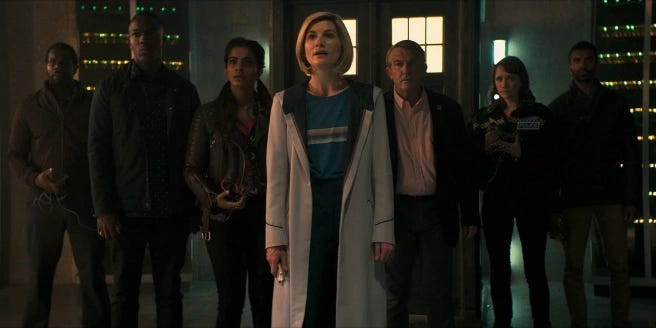
3. Season’s Greetings
Perhaps Lin and Mitch will return in Series 12 to revisit these concerns. And I hope the same can be said for Aaron, whom the Dalek also briefly subjugates after Team TARDIS breaches the weapon-laden armor that the creature builds for itself. The Dalek’s process of reconstituting itself not only consumes a good deal of “Resolution” but also replicates the best aspects of writer Robert Shearman’s “Dalek,” the groundbreaking Series 1 episode (first broadcast on 20 April 2005 and adapted by Sherman from his own 2003 Big Finish Productions audio drama Jubilee) that returned the Doctor’s most inexorable nemesis to our television screens.
“Dalek” shows its namesake—finally and fully—as the cunning, manipulative, and unstoppable killing machine that Terry Nation envisioned when he created these battle-scarred mutants for Classic Who’s seven-part serial The Daleks, first broadcast from 21 December 1963 to 1 February 1964 as part of the franchise’s first-ever season.
In Sherman’s installment, the Ninth Doctor (Christopher Eccleston) and companion Rose Tyler (Billie Piper) discover a lone Dalek survivor of the Last Great Time War shackled, studied, and tortured in the underground laboratory of billionaire Henry Van Statten (Corey Johnson). When Rose’s compassion for this seemingly distraught, pitiful creature allows it to escape, the Dalek rampages through Van Statten’s complex, massacring dozens of soldiers and scientists without remorse or regret.
These scenes remain, even today, disturbing in their straight-ahead depiction of the heartless, insistent, and mindful brutality that makes the Daleks inevitable embodiments of fascist hatred and violence. The Daleks have been so frequently compared to the Nazis—and their creator, Davros (Michael Wisher, David Gooderson, and Terry Molloy in Classic Who, Julian Bleach in New Who) to both Hitler and Josef Mengele—that Doctor Who’s fans can sometimes forget what this analogy means.
Yet Robert Sherman, with Russell T. Davies’s help, reminds us precisely how terrifying these creatures can be in “Dalek,” as does Chris Chibnall in the scenes of slaughter that make “Resolution” a worthy, if faulty, successor to Sherman’s outstanding New Who contribution. When the reborn Reconnaissance Dalek—once again superbly voiced by Nicholas Briggs—easily exterminates a squad of British Army soldiers before attacking England’s General Communications Headquarters (GCHQ) to use its technology to broadcast a transmission that will invite other Daleks to invade Earth, this destructive conquest becomes intense enough that I can only admire director Wayne Yip’s and his production crew’s commitment to pulling no punches when depicting the Dalek’s reign of destruction.
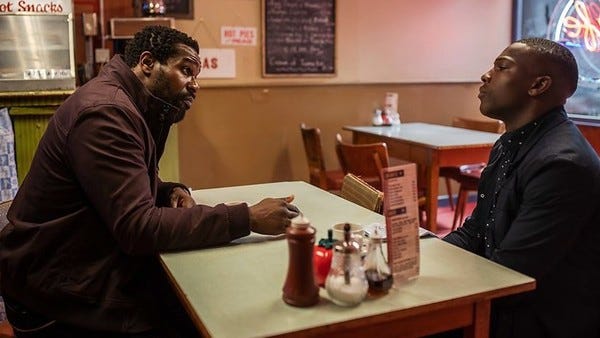
That’s heady stuff for New Year’s Day, but Chibnall and his team, especially composer Segun Akinola, succeed in returning the Daleks to the implacable enemy they were always meant to be. Russell T. Davies and Steven Moffat brought the Daleks back again and again during their eras, which led to diminishing returns during Moffat’s tenure as showrunner, so much so that even the concept of a “moral Dalek” so disgusted by his species’ genocidal tendencies that it decides to exterminate all fellow members in Series 8’s “Into the Dalek” is neither as intriguing nor as effective as it could and should be.
“Resolution” moves along different paths that see Whittaker’s Thirteenth Doctor both disturbed and frightened by her reborn archenemy, but then resolute (see how that works?) in her determination to rid the universe of the Reconnaissance Dalek. She takes Lin and Mitch, all three companions, and the captive Aaron into the TARDIS, then parks her ship near a supernova whose gravity pulls the Dalek creature right off Aaron’s back. This solution is both silly and spooky, continuing the tonal madness that’s characterized Doctor Who throughout its 55-year lifespan, and that Chibnall embraces during Series 11.
“Resolution,” despite its repudiation of easy solutions in some matters, still concludes on too-tidy notes by having Aaron refuse to travel with Team TARDIS while Lin and Mitch look forward to their shared future. Chibnall’s desire to reset the program’s narrative origins to their starting point means that, when Series 12 begins, the Thirteenth Doctor will travel with her three regular companions even if seeing Ryan and Aaron get to know one other as they travel through space and time is a far more intriguing plotline. Ditto for Lin and Mitch, so let’s hope Chibnall brings all three characters back in future episodes.
But Doctor Who doesn’t traffic in guarantees, so we shouldn’t hold our collective breath, making the final dialogue in “Resolution” all the more significant. When Yaz asks the Doctor, “Where to next?,” the Doctor replies, “I was thinking everywhere.”
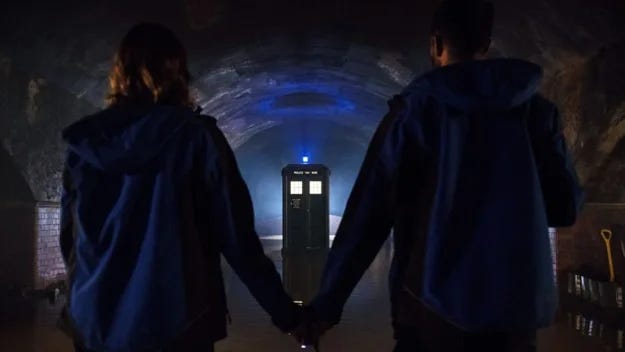
Yes indeed.
Chris Chibnall’s firm command of Series 11, along with his cast’s and crew’s expert work, means that Doctor Who remains one of the best series on television anywhere in the world. At the time of Series 11’s broadcast, 14 years had elapsed since New Who first premiered, which was a tremendous legacy for Chibnall and company to extend, but that they accomplished with wit, guile, and passion. Series 11’s missteps—along with Chibnall’s impulse to settle more character arcs than seems wise in “Resolution”—made his vision and version of New Who as fascinating, flawed, and mercurial as the franchise had—and has—always been.
Indeed, these criteria suggest that “Resolution” is an ideal capper for Chibnall’s first series as showrunner. After all, this episode’s deliriously thought-provoking entertainment leaves attentive viewers slightly dissatisfied, yet wanting more! more! more!—and, like children everywhere, wanting it right now.
So, full marks to Chris Chibnall, Jodie Whittaker, everyone still creating Doctor Who, and everyone still watching it.
We’ve kept the faith.
FILES
NOTES
Nicola Methven, “Doctor Who Christmas Special Scrapped after Bosses ‘Run Out’ of Ideas—but There Is Good News for Fans,” 1 November 2018, Daily Mirror, https://www.mirror.co.uk/tv/tv-news/doctor-who-christmas-special-scrapped-13520717.
Moffat, as we now know, acceded to Russell T. Davies’s request to write another Doctor Who script for Series 14 when Davies returned in 2022 as New Who’s showrunner once Chris Chibnall left this role, after three seasons and 31 episodes as Who’s master impresario.
Moffat, indeed, agreed to write two new Doctor Who teleplays: Series 14’s third installment, “Boom” (first broadcast on BBC One and streamed on Disney+ on 17 May 2024, becoming one of New Who’s best-ever outings), and 2024’s Christmas Day Special, “Joy to the World” (first broadcast on BBC One and streamed on Disney+ on 25 December 2024).
See, among others, the following articles where Chibnall confirms Series 11’s “all-new monsters” rule and denies the Daleks’ return:
A) Huw Fullerton, “Doctor Who Boss Promises ‘All-New Monsters’ for Jodie Whittaker’s First Series,” 16 July 2018, Radio Times, https://www.radiotimes.com/news/tv/2018-07-16/doctor-who-series-11-monsters-all-new-chris-chibnall-jodie-whittaker/, and
B) Huw Fullerton, “Doctor Who Will Not Feature Any Daleks Confirms New Showrunner,” 20 July 2018, Radio Times, https://www.radiotimes.com/news/tv/2018-07-20/doctor-who-series-11-monsters-no-daleks/.
See, among others, the following articles for Chibnall’s comments about keeping Doctor Who competitive in the Peak TV Era:
A) Stephen Kelly, “Chris Chibnall: ‘I Don’t Know How Many Times I Need to Say It. There Are No Old Monsters in This Series,’” 22 September 2018, Radio Times, https://www.radiotimes.com/news/tv/2018-09-22/chris-chibnall-i-dont-know-how-many-times-i-need-to-say-it-there-are-no-old-monsters-this-series/, and
B) Philip Bates, “Chris Chibnall: ‘There Are No Old Monsters in Doctor Who Series 11,” 25 September 2018, The Doctor Who Companion, https://web.archive.org/web/20181231135204/https://thedoctorwhocompanion.com/2018/09/25/chris-chibnall-there-are-no-old-monsters-in-doctor-who-series-11/.




